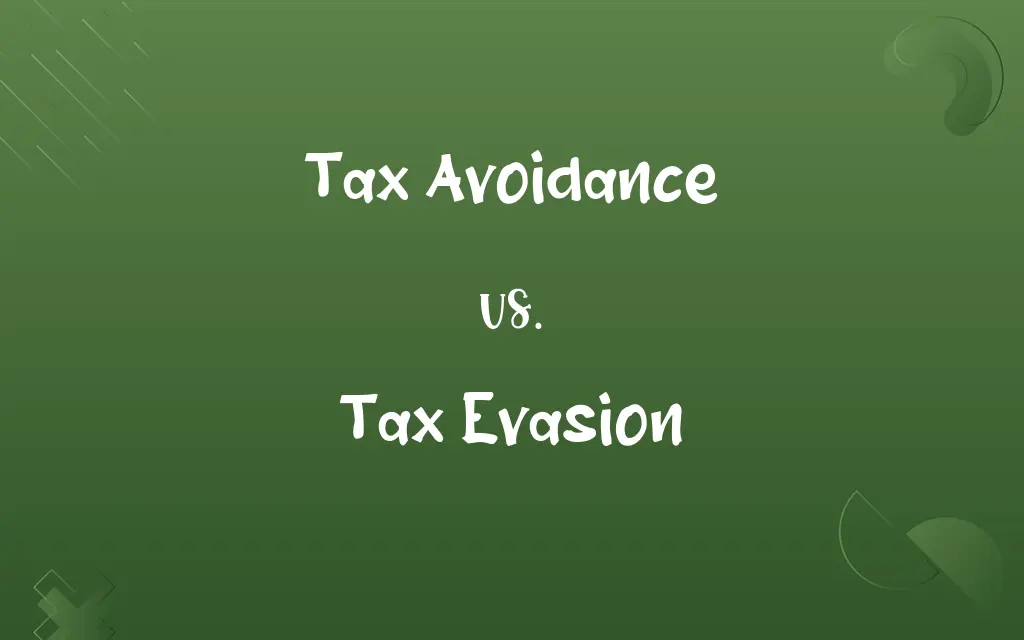Tax Avoidance vs. Tax Evasion: Know the Difference

By Shumaila Saeed || Published on January 19, 2024
Tax Avoidance is legally minimizing tax liability through effective financial planning, while Tax Evasion is the illegal practice of not paying taxes owed.

Key Differences
Tax Avoidance is the use of legal strategies to minimize the amount of tax owed by an individual or a business. It operates within the bounds of the law. Tax Evasion, in contrast, involves illegal methods to avoid paying taxes, such as underreporting income or inflating deductions, which is against the law.
Shumaila Saeed
Jan 19, 2024
Tax Avoidance includes actions like investing in tax-saving schemes, making charitable donations, or legal deductions. Tax Evasion, however, might involve hiding income, falsifying records, or not filing tax returns.
Shumaila Saeed
Jan 19, 2024
The consequences of Tax Avoidance are generally minimal since it is a legal practice. Tax Evasion, on the other hand, can lead to significant legal penalties, including fines and imprisonment.
Shumaila Saeed
Jan 19, 2024
Tax Avoidance is often scrutinized by tax authorities to ensure it does not cross into evasion. Tax Evasion is actively investigated and penalized by tax authorities and law enforcement.
Shumaila Saeed
Jan 19, 2024
Tax Avoidance, while legal, can sometimes be seen as ethically questionable, especially when it leads to significantly reduced tax liabilities for wealthy individuals or corporations. Tax Evasion is both illegal and widely considered unethical due to its nature of deceit and legal violation.
Shumaila Saeed
Jan 19, 2024
ADVERTISEMENT
Comparison Chart
Methods
Using deductions, credits, tax-saving investments
Underreporting income, falsifying records
Shumaila Saeed
Jan 19, 2024
Consequences
None, if within legal limits
Legal penalties, fines, imprisonment
Shumaila Saeed
Jan 19, 2024
Regulatory Response
Scrutiny to ensure legality
Actively investigated and penalized
Shumaila Saeed
Jan 19, 2024
ADVERTISEMENT
Tax Avoidance and Tax Evasion Definitions
Tax Avoidance
Minimizing tax liability through legal means.
They practiced tax avoidance by contributing to a retirement account.
Shumaila Saeed
Jan 08, 2024
Tax Evasion
Illegally avoiding payment of taxes.
Hiding income was a clear case of tax evasion.
Shumaila Saeed
Jan 08, 2024
Tax Avoidance
Legally exploiting tax rules for a fiscal advantage.
Tax avoidance involved investing in government bonds.
Shumaila Saeed
Jan 08, 2024
Tax Evasion
Deliberate misrepresentation or concealment of financial information to reduce tax.
Falsifying invoices to reduce taxable income was tax evasion.
Shumaila Saeed
Jan 08, 2024
Tax Avoidance
Reducing taxes through allowable deductions and credits.
They engaged in tax avoidance by utilizing educational tax credits.
Shumaila Saeed
Jan 08, 2024
ADVERTISEMENT
Tax Evasion
Illicit practices to escape tax liabilities.
Engaging in off-the-books transactions constituted tax evasion.
Shumaila Saeed
Jan 08, 2024
Tax Avoidance
Using tax laws to reduce taxable income.
Tax avoidance was achieved by claiming legitimate business expenses.
Shumaila Saeed
Jan 08, 2024
Tax Evasion
Violating legal tax obligations intentionally.
Underreporting sales to evade taxes was illegal.
Shumaila Saeed
Jan 08, 2024
Tax Avoidance
Strategically planning finances to lower taxes.
Their tax avoidance strategy included charitable donations.
Shumaila Saeed
Jan 08, 2024
Tax Evasion
Evading tax obligations through deceit.
Tax evasion was committed by not reporting overseas income.
Shumaila Saeed
Jan 08, 2024
Repeatedly Asked Queries
Is Tax Avoidance legal?
Yes, tax avoidance is legal and involves using tax laws to one's advantage.
Shumaila Saeed
Jan 19, 2024
What is Tax Evasion?
Tax Evasion is illegally avoiding paying taxes, often through deceit.
Shumaila Saeed
Jan 19, 2024
What are common Tax Avoidance methods?
Legal deductions, tax credits, and investment in tax-saving schemes.
Shumaila Saeed
Jan 19, 2024
What is Tax Avoidance?
It's the legal practice of reducing tax liability through lawful means.
Shumaila Saeed
Jan 19, 2024
Are there penalties for Tax Evasion?
Yes, tax evasion can lead to severe legal penalties, including fines and imprisonment.
Shumaila Saeed
Jan 19, 2024
Can Tax Avoidance become Tax Evasion?
If tax avoidance strategies cross legal boundaries, they can become tax evasion.
Shumaila Saeed
Jan 19, 2024
Can businesses practice Tax Avoidance?
Yes, businesses can legally minimize taxes through various strategies.
Shumaila Saeed
Jan 19, 2024
How do authorities detect Tax Evasion?
Through audits, investigation of discrepancies, and financial tracking.
Shumaila Saeed
Jan 19, 2024
Do tax laws change impact Tax Avoidance strategies?
Yes, changes in tax laws can affect the effectiveness of avoidance strategies.
Shumaila Saeed
Jan 19, 2024
Is Tax Evasion always intentional?
Yes, tax evasion involves intentional actions to evade tax obligations.
Shumaila Saeed
Jan 19, 2024
How risky is Tax Evasion?
It's very risky due to the legal repercussions and penalties involved.
Shumaila Saeed
Jan 19, 2024
Is Tax Evasion a criminal offense?
Yes, tax evasion is considered a criminal offense.
Shumaila Saeed
Jan 19, 2024
What's the ethical view on Tax Avoidance?
It's legal but sometimes ethically questioned, especially if it leads to minimal tax contribution.
Shumaila Saeed
Jan 19, 2024
Are there global measures against Tax Evasion?
Yes, many countries collaborate to prevent and penalize tax evasion.
Shumaila Saeed
Jan 19, 2024
What is the social impact of Tax Evasion?
Tax evasion undermines public services and social trust.
Shumaila Saeed
Jan 19, 2024
Do tax authorities audit more in cases of suspected Tax Evasion?
Yes, suspected evasion often triggers more intensive audits and investigations.
Shumaila Saeed
Jan 19, 2024
Do both individuals and corporations practice Tax Avoidance?
Yes, both individuals and corporations use legal means for tax avoidance.
Shumaila Saeed
Jan 19, 2024
Can ignorance lead to accidental Tax Evasion?
Yes, misunderstanding tax laws can unintentionally lead to evasion.
Shumaila Saeed
Jan 19, 2024
How do governments respond to Tax Avoidance?
Governments may scrutinize and sometimes tighten laws to limit avoidance.
Shumaila Saeed
Jan 19, 2024
Can Tax Avoidance lead to public scrutiny?
Yes, especially for large corporations and high-net-worth individuals.
Shumaila Saeed
Jan 19, 2024
Share this page
Link for your blog / website
HTML
Link to share via messenger
About Author
Written by
Shumaila SaeedShumaila Saeed, an expert content creator with 6 years of experience, specializes in distilling complex topics into easily digestible comparisons, shining a light on the nuances that both inform and educate readers with clarity and accuracy.








































































